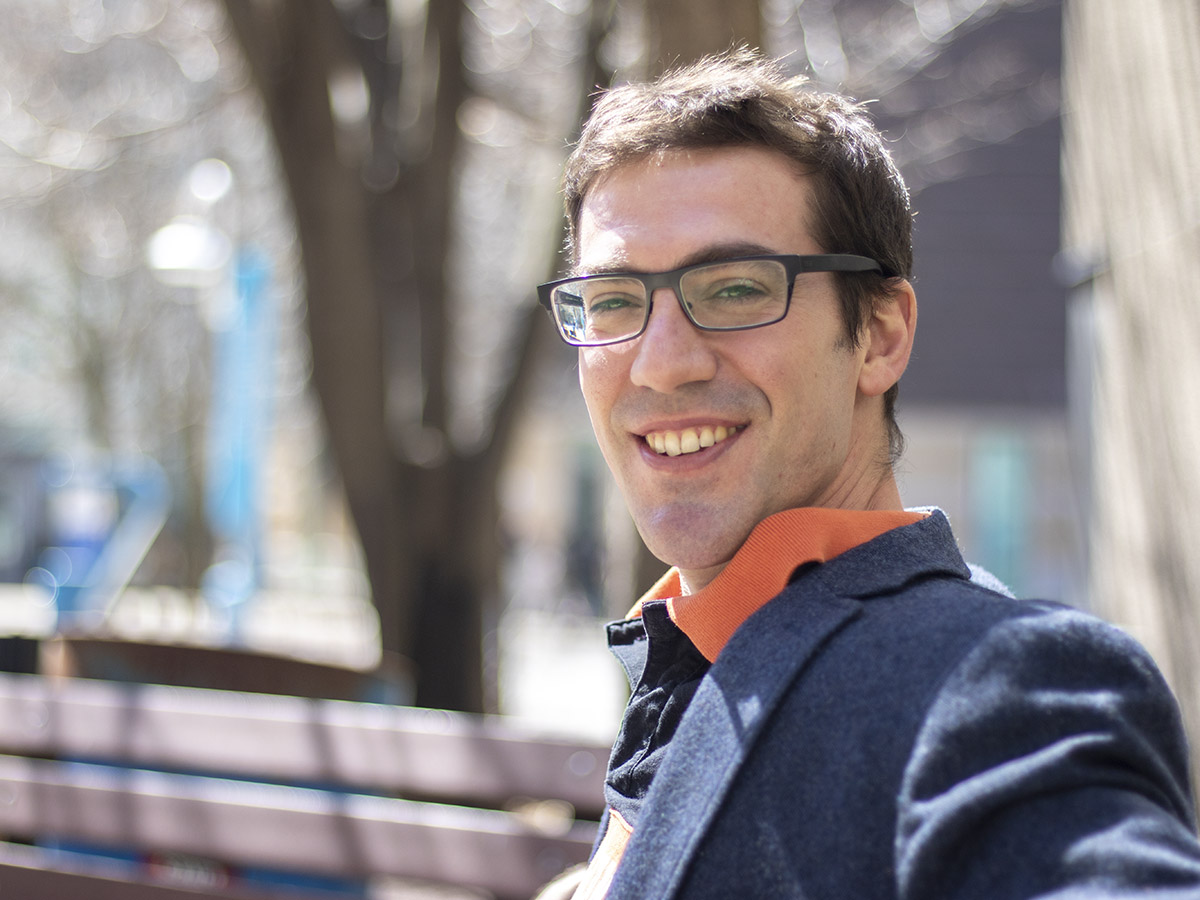Graduate Program in Building Science
What makes this program different?
Through this interdisciplinary curriculum, building science students gain deep knowledge of retrofits, field measurements, forensic investigation, testing/modelling, and construction processes to reduce the impact of buildings on the natural world.
Degree: PhD, MASc, MBSc (PT option)
Program: Building Science
Fee range: Domestic: $9,500-$11,000
Practical research AND professional development opportunities
Pursue a career in industry or academia, and elevate your understanding of building science in the field.
Students have the opportunity to join multidisciplinary researchers to conduct sophisticated building systems investigation within our state-of-the-art studios and labs including: METRIC, SCIT Hub, and the digital fabrication lab.
The most diverse and applicable building science lab in any Canadian university
Explore applied building enclosure theory, quantify the durability of building materials and use an expansive collection of tools to deepen knowledge of innovative building performance. Beyond our Building Science Lab, students have access to wood shop and digital fabrication labs. Our full-scale building enclosure lab and mass timber test facility support ongoing innovative research and teaching.
Interdisciplinary expertise & a commitment to support your academic and personal growth
With small cohort sizes, candidates enrich our shared learning with their diverse backgrounds in building science, various engineering disciplines, architectural science/architecture construction and a number of other related disciplines. Students thrive because they receive the individual attention needed to grow as academics and skilled professionals.
Fund your studies and business ideas
Explore scholarships, awards, and more opportunities to finance your studies.
If you have an innovative idea or startup, you may also qualify for Esch Award funding, which supports eligible ventures from the ideation to launch stages.

Explore your journey
PhD
Ideal for students with a master’s degree who want to pursue a career in academia or a professional research career in building science.
4 years typical to completion (funded)
MASc
Ideal for students who want to pursue in-depth study of a particular aspect of building science.
2 years typical to completion (funded)
MBSc
Ideal for students who prefer coursework over in depth research and who want to elevate their understanding of building science.
1 year typical to completion (non-funded)
| PhD | MASc & MBSc |
|---|---|
Grade requirements:
|
|
Application requirements:
|
Application requirements:
|
Deepen your knowledge of applied building science - innovative building performance, enclosure performance, durability, energy modelling, retrofit design, field testing, forensic investigation, and more.
Core courses:
- BL8100 Building Science Theory
- BL8101 Building Envelope Systems
- BL8102 Ecological and Resource Efficient Design
- BL8103 Energy Efficient Building Services
- BL8104 Building Design Seminar/Studio
Electives:
- BL8201 Sustainability, Heritage and Existing Buildings
- BL8202 Building Automation
- BL8203 Health, Human Comfort and Indoor Environment
- BL8204 Building Performance Simulation/Modeling
- BL8205 Fire Safety Design
- BL8206 Advanced Acoustic Design
- BL8207 Building Performance Assessment
- BL8208 Detail Design Project
- BL8209 Directed Studies in Building Science
- BL8210 Building Science and Architectural Research Methods
- BL8211 Lighting Design in Buildings
- BL8212 Renewable Energy Systems in Buildings
- BL8213 Passive House Design and Construction
- BL8214 Life Cycle Assessment
- BL8215 Building Envelope Restoration
- CV8106 Advances in Concrete Materials
- CV8306 Durability of Structures
- ES8903 Pollution Prevention
- ES8910 Energy and the Environment
- ES8923 Environmental Assessment
- ES8924 Environmental Management Systems
- ME8114 Energy Management
Visit the graduate calendar for full course descriptions and the current courses page to see which courses are offered this academic year.

“Building science by definition is interdisciplinary and is at the intersection of engineering, architecture, sciences and life sciences to understand the behaviour of a building as a system. It affects greenhouse gas emissions, energy consumption, thermal comfort, indoor air quality and more. The courses in this program were designed with this in mind, ensuring the students that graduate can solve complex problems using fundamental knowledge gained from this program.”
| PhD | MASc | MBSc |
|---|---|---|
|
|
|
Grade requirements: If a course mark is less than B- (2.67/4.33 or 70%) for both MBSc and MASc, and less than B (3.00/4.33 or 73%) for PhD, it is considered a failure. You will be required to repeat the course or replace the credit with another course. Failure to maintain an acceptable academic standing will be considered grounds for dismissal.
Enrich your learning through research, labs & community
- Low energy design - building and products designed to reduce energy consumption
- Green building assessment systems - explores how to mitigating the impact of buildings on the natural environment through sustainable design
- Building envelopes - explores the design of the building’s foundation, walls, roof, windows and doors
- First Nations housing needs in the far north - Partnering with band councils to co-design and construct housing to support the needs of community members individually or as a whole
- Hygrothermal performance of mass timber - predicts the wetting and drying behaviour of mass timber during construction and in service
- Passive systems - explores advantageous solutions for natural heating and warmth distribution
- Life cycle assessment - analyzes the impact building solutions may have on the surrounding world
- Materials existing buildings - investigation of existing buildings and use of recycled building materials
- Advanced mechanical system design and development - low-impact solutions to provide and manage energy within buildings
- Building performance evaluation - considers energy efficiency, environmental impact, occupant satisfaction, functionality and more
- + more!
The Graduate Program in Building Science has a state of the art laboratory with a full-time lab manager that has expertise in material testing, building performance testing, field testing, and material science. Beyond our laboratory, our program has a full-scale enclosure test facility minutes away from our home building. Students and researchers take advantage of our range of facilities including:
- Our innovative Building Science lab - The most diverse and applicable building science lab in any Canadian university – you can test the durability of building materials, explore the principles of energy efficiency, see first-hand how the environment impacts structural integrity, and more.
- Our full field testing lab features a number of tools, instruments and machines to deepen your knowledge of innovative building performance. These tools include an accelerated aging machine, environmental and stability chambers, a thermal conductivity machine and a freeze-thaw chamber.
- METRIC is a state-of-the-art test cell for advanced building systems and material performance evaluation. This facility allows studies on new and existing building systems, with over 500 sensors embedded in a multi-physics approach.
- Our mass timber test facility has a controlled interior environment and the ability to monitor moisture content, temperature and relative humidity of mass timber wall and roof enclosures.
The world’s first 100% digitally-enabled facility, the SCITHub integrates a diverse range of building systems technology, enabling students to develop, test, and showcase the full range of smart building technologies and helps propel Canada’s built environment towards net-zero emissions.
The Building Science Program is a dynamic and inclusive community that brings together students from a wide range of backgrounds, united by a shared commitment to improving the built environment. Whether coming from architecture, engineering, construction or other disciplines, the students that choose this program form strong bonds through a collective passion for sustainability, innovation and social impact.
This diverse group fosters a sense of family, where collaboration and mutual support thrive as they work towards creating solutions that enhance the quality of life for people and communities. Together, they are driven by the common goal of making the world a better, more sustainable place through thoughtful, impactful design and construction.

What can you do with this degree?
Career possibilities
Our graduates are everywhere in our industry. From building science consulting firms to technical leads in architecture firms and building science specialists in large construction firms,, our grads are leading industry through their various roles. Our graduates have had other trajectories including employment at research institutes, government (all levels), not-for-profit organizations, developers; some of our graduates have also started their own companies and are leaders in their field.
Current industry partners:
- BEAD, United Arab Emirates
- City of Markham
- City of Toronto
- Eastern Construction
- Ellis Don
- ENgineering Link
- Morisson Hershfield (now stantec?)
- PCL Constructors Canada
- RDH
- RJC ENgineering
- Science and Technology at TDSB
- Transolar
- TRCA
- Turner Townsend cm2r Inc.
- + more…

Matthew Tokarik
President at Subterra Renewables
“The MASc program gave me specific skills and knowledge that I use every day in my work—from building envelopes to HVAC, sustainability and energy efficiency.”
Master of Applied Science ʼ15

Kaitlin Carroll
Retrofit Services Manager at The Atmospheric Fund (TAF)
“My master's really had two strengths. First, it was focused enough to provide me with a deep understanding of building science theory. It was also very practical, despite the common notion that master’s degrees will be very theoretical. I learned a lot of skills that I use in my job at The Atmospheric Fund (TAF) every day. I definitely felt more prepared for the professional realm after completing my degree.”
Master of Building Science ʼ15

Stacy Sun
Performance Analyst, Purpose Building
“The DAS studio encourages collaboration between building science and architecture students. Since we all come from diverse academic backgrounds, we approach the same problems differently, which results in more innovative solutions. The open-conversation environment also allows us to develop lasting professional relationships and friendships."
Master of Applied Science ʼ15

